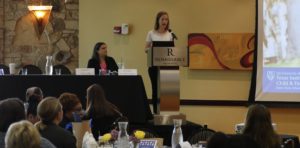How One Person Can Make A Difference: The Importance of Foster Care Liaisons
By Allie Long
Last month, the Texas Institute for Child & Family Wellbeing co-hosted the 10th Annual Education Reach for Texans Conference in Austin, TX. Held every June, the 2019 forum brought together over 170 postsecondary child welfare professionals from across the state of Texas. Since 2015, it has been legally required under the Texas Education Code for every university in the state to have at least one employee working as a university liaison for students that are former foster youth.
It has been reported that 96% of Texas foster alumni do not have a postsecondary education degree or certificate. With that said, the role of a university advocate and mentor solely dedicated to the success of foster alumni can be vital. This person can serve to bridge the gap between students wanting to pursue higher education and those who have the support necessary to complete a degree.

Because the 2015 implementation of foster liaisons in higher education is still recent, researchers at UT Austin wanted to better understand how this position’s duties are being implemented across Texas campuses. At the Education Reach for Texans Conference, TXICFW Director Dr. Monica Faulkner and Plan II UT Graduate Audrey Urbis co-presented their foster care liaison survey findings for the first time ever.
Foster care liaisons were found through their professional listings, available on the Texas Higher Education Coordinating Board website. Of the 91 total Texas liaisons, 48 liaisons from 40 different schools responded and participated in the TXICFW online survey. They were recruited through emails and follow up phone calls.
Based on the data, researchers found that Texas foster care liaisons have worked in higher education for an average of 16.4 years. About half of the liaisons have been in this role since 2016. On the whole, foster care liaisons reported feeling very positively about their roles, with 79% of liaisons expressing that they enjoy their jobs.

However, these liaisons also reported that they need more university support and a greater knowledge of the foster system in order to truly be effective in their roles. Just half of the participants reported that they have enough time to fulfill their role as a foster care liaison. Sadly, about 30% of respondents reported that they do not understand what they are supposed to do as a foster care liaison, which begs the question: how can we better empower liaisons to effectively fulfill the responsibilities of this role?
It was noted that liaisons were curious to find ways to better support their students. Sixty-seven percent of liaisons disclosed that they would like to know more information about how the foster care system works, and 50% want to learn how a trauma-informed approach could be beneficial for their students.
Just as the liaisons need more support, so too do their students. Eighty-seven percent of liaisons reported that foster alumni have little social support and limited access to mental health care or financial resources for emergencies, which are two of several significant barriers that contribute to achieving academic success.

Ultimately, this survey was an incredibly meaningful glimpse into the significance of this programming, while also emphasizing that there’s still much more work to be done. For starters, researchers stressed the importance of providing equivalent support to foster youth populations, even though the numbers of foster alumni in higher education are relatively small. It can make a world of difference for a student to know that they automatically have a support network through their foster care liaison, which is the ultimate goal of this program.
Additionally, researchers recommended that universities provide liaisons with greater support via funding and a release from extraneous job duties. In this way, liaisons might feel better cared for in their professional setting, which could in turn incentivize them (be it through time, money, resources, etc.) to fully focus on the needs of their foster students.
To learn more about The Education Reach for Texans Conference, visit educationreachfortexans.org.
